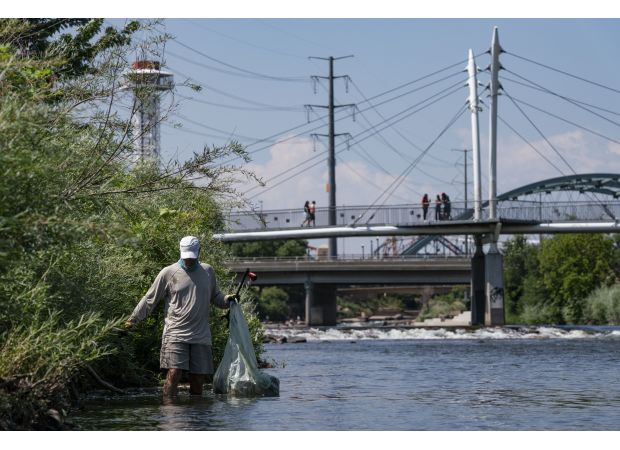Denver's South Platte River is currently not suitable for swimming due to pollution, and addressing this issue is proving difficult.
The South Platte River in Denver is facing environmental challenges that have recently gained attention.

As volunteers work to clean up the South Platte River in Denver, they come across a wide range of discarded items along the banks: shopping carts, food wrappers, and even old car phones from the 1990s. While there are efforts underway to revitalize the river and develop its surrounding areas, the water quality still falls below state standards in some areas. In fact, some parts of the river still have a strong unpleasant odor. Despite former Mayor Michael Hancock's promise to make the river suitable for swimming, city health officials advise against it, especially during the summer months.
According to Jon Novick, the administrator of the water quality program at the Denver Department of Public Health and Environment, it is much safer to go swimming in a pool. The recent focus on the South Platte River by developers, community leaders, and city officials has brought to light the numerous environmental challenges that still exist. This includes the discharge of wastewater from treatment plants and the release of various substances by companies such as Suncor Energy, including inorganic nitrogen, arsenic, and PFAS compounds known as "forever chemicals."
The health department in Denver has been monitoring the conditions of the river for many years, including water temperature, acidity, nutrients, and metals. However, their main concern is the presence of E. coli bacteria, which can cause infections and make people sick if ingested. The bacteria can enter the water through animal or human waste, and the city's aging infrastructure means that sewage can sometimes leak into the river. Additionally, all of the stormwater in the city flows into the South Platte, making the bacteria spread even faster during the warmer summer months.
In their most recent water quality report, published last October, the DDPHE ranked the South Platte's water quality as "fair," which is above "marginal" and "poor," but still below "good." E. coli levels exceeded the standard set by the Colorado Water Quality Control Commission throughout the entire year of 2022. The river also exceeded the standard for arsenic, which is naturally occurring in the bedrock beneath the city.
On a hot day in June of 2024, Victoria Britto seeks relief from the heat by cooling off in the South Platte River at Confluence Park in downtown Denver. However, the river is not only affected by industrial and municipal pollutants but also by the byproducts of the millions of people who live nearby. Trash, lawn fertilizers, runoff from roads, pet waste, and even oil and grease from vehicles eventually make their way into the river.
The Mile High Flood District works to help local governments improve their stormwater cleaning processes before it reaches the river. Founded after the disastrous flood in Denver in 1965, the district has noticed some positive trends in the river's health. According to Holly Piza, the district's research and development director, nutrients such as phosphorus and nitrogen have generally decreased. These nutrients, found in products like fertilizers, can cause algae blooms and harm aquatic ecosystems.
However, Piza also notes that other water quality issues are worsening, such as salinity, which can damage infrastructure and harm aquatic life. Efforts to reduce this problem in Denver include the use of bioretention ponds outside the Carla Madison Recreation Center on Colfax Avenue. These ponds help retain water after rainfall and filter it through the soil, rather than allowing it all to flow directly into the river.
Novick and Piza encourage Denver residents to be more mindful of their actions to help improve water quality. This includes avoiding the use of fertilizers with phosphorus or nitrogen, not littering, washing cars at a car wash, and ensuring that sprinklers are watering grass, not pavement. While the city is taking steps to improve the water quality, Novick acknowledges that they cannot be everywhere and do everything. So, it is up to everyone to do their part in keeping the South Platte River clean and healthy. To stay updated on Colorado news, you can sign up for the Mile High Roundup email newsletter.






